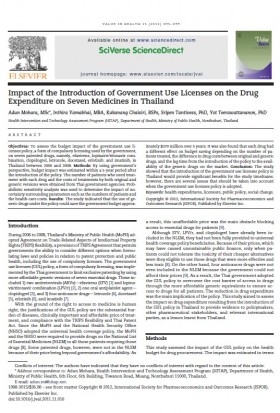This website uses cookies so that we can provide you with the best user experience possible. Cookie information is stored in your browser and performs functions such as recognising you when you return to our website and helping our team to understand which sections of the website you find most interesting and useful.
Impact of the Introduction of Government Use Licences on the Drug Expenditure on Seven Medicines in Thailand. (2012)

รายละเอียดเพิ่มเติม
Impact of the Introduction of Government Use Licences on the Drug Expenditure on Seven Medicines in Thailand.
Adun Mohara, MSccorrespondenceemail, Inthira Yamabhai, MBA, Kakanang Chaisiri, BSPs, Sripen Tantivess, PhD, Yot Teerawattananon, PhD
Health Intervention and Technology Assessment Program (HITAP), Department of Health, Ministry of Public Health, Nonthaburi, Thailand
Abstract
Objectives
To assess the budget impact of the government use licenses policy, a form of compulsory licensing used by the government, on seven patented drugs, namely, efavirenz, lopinavir/ritonavir combination, clopidogrel, letrozole, docetaxel, erlotinib, and imatinib, in Thailand between 2006 and 2008.
Methods
By using government’s perspective, budget impact was estimated within a 5-year period after the introduction of the policy. The number of patients who need treatment with each drug and the costs of treatments by both original and generic versions were obtained from Thai government agencies. Probabilistic sensitivity analysis was used to determine the impact of uncertainty surrounding parameters such as the numbers of patients and the health-care costs.
Results
The study indicated that the use of generic drugs under the policy could save the government budget approximately $370 million over 5 years. It was also found that each drug had a different effect on budget saving depending on the number of patients treated, the difference in drug costs between original and generic drugs, and the lag time from the introduction of the policy to the availability of the generic drugs on the market.
Conclusion
The study showed that the introduction of the government use licenses policy in Thailand would provide significant benefits for the study timeframe; however, there are several issues that should be taken into account when the government use licenses policy is adopted.
Full Text: http://www.valueinhealthjournal.com/article/S1098-3015%2811%2903553-4/abstract




